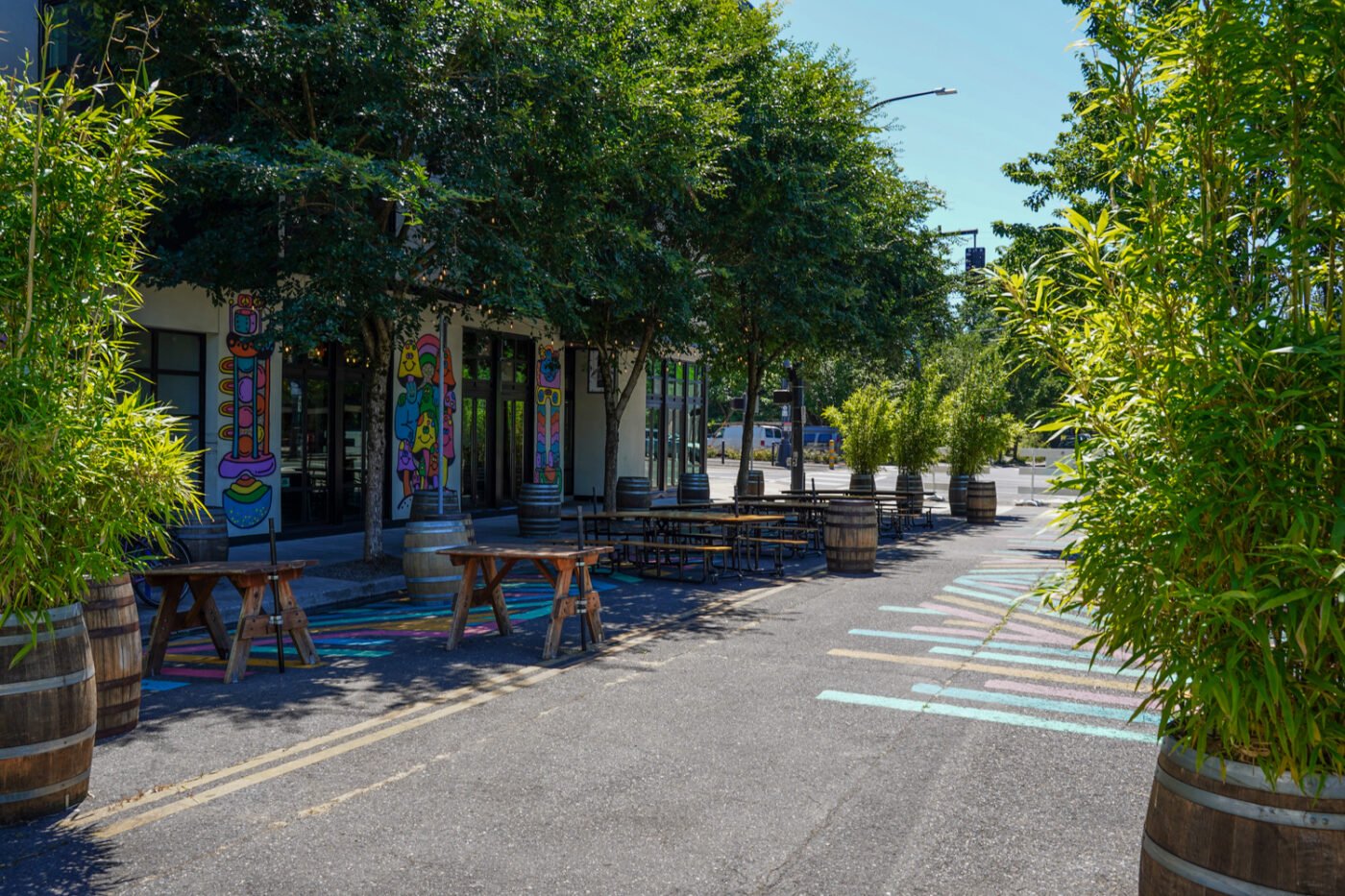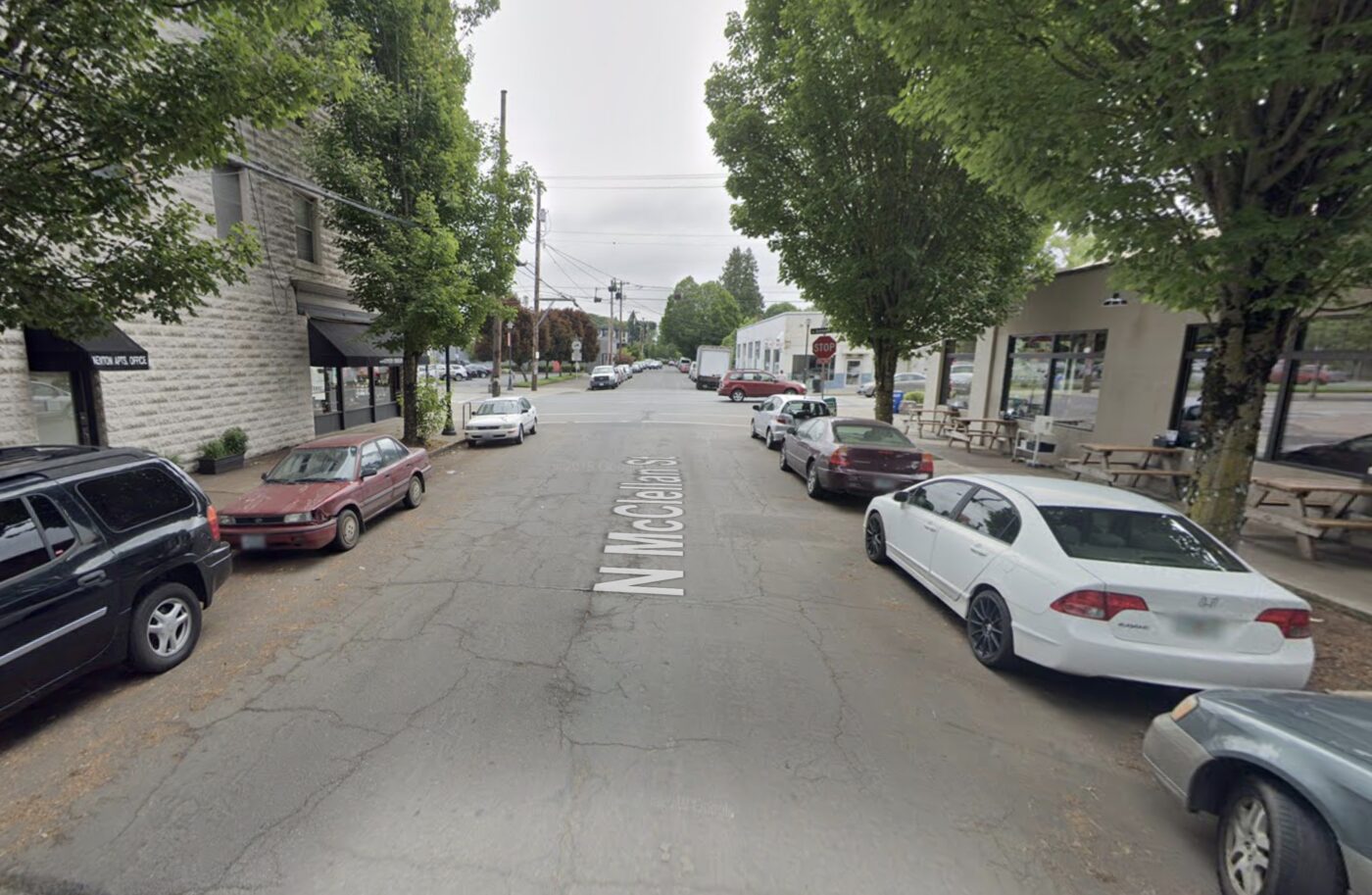Last week we shared a story about how the owner of Mayfly Taproom in Kenton was alarmed because the Portland Bureau of Transportation (PBOT) wanted to re-open the plaza in front of his business to car drivers. PBOT has said Fenwick Plaza doesn’t fit their vision for a neighborhood public street space and would have to be removed this fall. But now the city might reconsider that position based on community feedback and the issue has sparked a robust conversation about public plazas and who they serve.
For the past three years, Mayfly owner and proprietor Ryan Born has relied on a carfree block on N Fenwick Ave (at N Interstate) to, literally and figuratively, expand his business. Born credits the colorful tables and space in Fenwick Plaza as the reason he’s survived the rocky post-pandemic years. He feels if PBOT allows drivers to use the street again it will hurt his business, be a loss for the community, and make the street more dangerous.
“It raises questions as to whether this location is where Kenton neighborhood wants us to invest limited placemaking resources.”
– Dylan Rivera, PBOT
Born operates his plaza under the same Healthy Business Program permit he received when the program first launched in fall 2021. That program ended in August 2023 (because the federal funding that paid for it ran out) and morphed into what’s now called the Outdoor Dining Program. Unlike the Covid era Healthy Business Program, the new Outdoor Dining program (which was formally adopted by city council in August 2023) offers permits for sidewalk cafes and street seats — but does not include carfree street plazas.
Turning former streets into public spaces requires more planning than simply using the sidewalk or a few parking spaces, and PBOT hasn’t completed all the necessary budgeting and policy work to make them a permanent part of their portfolio. Amid staff turnover and a recent budget crisis, PBOT’s Public Street Plaza Program remains in pilot mode and has made slow but steady progress since its launch at an enthusiastic press conference in March 2022. The city continues to work on things like plaza design standards, maintenance agreements, activation methods and so on.
Part of the issue with Fenwick Plaza (and a few other plazas whose locations I’m still trying to track down) is that it’s caught in a bureaucratic grey area. These spaces exist around town, but they’re operating without a solid policy foundation and the plan for their future remains unclear.
Another issue at play is who benefits most from these spaces. During the creation of their Outdoor Dining program PBOT heard concerns from some Portlanders about the “over privatization of the right-of-way,” said PBOT spokesperson Dylan Rivera in an email to BikePortland Friday evening. Put another way, PBOT wants to make sure these plazas — which are on streets in the public right-of-way — primarily serve the public, not a single private business.
On Friday I asked PBOT: Is the crux of the issue with Fenwick Plaza that PBOT believes it only serves one business?
“Yes,” Rivera replied. “In the sense that it raises questions as to whether this location is where Kenton neighborhood wants us to invest limited placemaking resources. We would love to be able to create multiple public plazas in every neighborhood but, at this moment, in our program infancy, we are unable to spread ourselves so thin.”
To make a plaza successful, PBOT says they require materials like planters, picnic tables and other types of seating, even public art. And staff and funding are needed to deal with things like graffiti, garbage, and replacing broken traffic control devices and other damaged furnishings. PBOT has also paid for live music performances in some plazas. “It’s a considerable investment,” Rivera says.
Rivera also said selection of plaza locations, “Is not as simple as evaluating whether a location checks all the boxes on a list of criteria.” PBOT wants to make sure a plaza will be maintained and activated. “Plazas require partnership between the city on the one hand, and businesses and community organizations on the other. It should be a process of working with the community to determine where a plaza could provide the most public benefit, and then working with that community partner on how to best design and activate that space.”
“Sort of like how PBOT works with communities to identify the best route for a neighborhood greenway or other transportation investment,” Rivera added.
When it comes to Fenwick Plaza specifically, Rivera said, “Earlier this month we gave [Ryan Born] and his business partners a heads up that with the formalization of the public street plaza we might not be able to justify a public street plaza at this location.” PBOT has proposed making Fenwick one-way northbound for road users and giving Born a permit for outdoor dining in the other lane.
As word has gotten out, PBOT has heard considerable support for Fenwick Plaza from the Kenton community. Based on that, it now appears PBOT might reconsider their previous decision.
A reader forwarded an email to BikePortland from the PBOT staffer in charge of the plaza program. On Friday afternoon, the PBOT staffer wrote: “Maintaining Fenwick as a public street plaza remains an option if the community choses it as the place where the greatest public space value can be attained.”
At the Kenton Neighborhood Association’s August 14th meeting (7:00 pm at Kenton Firehouse), PBOT will propose an alternate location that is closer to the Denver Avenue commercial corridor — specifically N McClellan on the west side of Denver. “This location is shaded, in the heart of pedestrian activity, has a lot of active land uses next to it, hosts the farmers market, and offers an opportunity to create a larger public plaza space,” wrote the PBOT staffer in an email, who also said they’re interested in hearing other location ideas.
These street plazas emerged from the chaos of Covid and have become one of the most popular PBOT endeavors in years. But as we’ve seen with programs like Sunday Parkways, popularity doesn’t always lead to pervasiveness.
Stay tuned for updates. Consider attending the meeting on August 14th and make sure you take PBOT’s current street plaza survey.
UPDATE, 7/23 at 5:50 pm:
Below is a Q & A based on emails between BikePortland and PBOT spokesperson Dylan Rivera:
Can you share an estimate for annual cost to PBOT for maintenance/implementation of a Public Street Plaza?
Current costs for the city can range from $20,000 to $35,000 a year for materials and services — not including city staff time.
Also, related to the budget question: If a business owner in a situation like Ryan and Mayfly was willing to pay for the upkeep and implementation of a full street plaza, would PBOT allow that?
We offered that option during the COVID-19 pandemic but that is no longer an option the bureau offers. If we were to start offering full street plazas to individual businesses, it would likely need to be established in a citywide policy.
It would likely be incredibly difficult to apply and manage fairly in a way to benefits the whole community. Street sizes and business sizes vary so much. It would be very challenging for the city to ensure businesses are activating the plazas and maintaining them in a way that makes them an asset to the community.
Or is it more about the public right-of-way for private gain and not solely a question of who foots the bill?
Yes. The public has expressed a concern about the privatization of the public right of way. This concern led to policy being developed that does not provide for a single business to close an entire street for business purposes. That said, we are exploring an idea for a seasonal plaza option that would provide curb to curb space, to test locations that could be suitable for a future plaza that could be year around — or just offered seasonally. Alternatively, perhaps some plazas would be most successful if they are operated only in the summer.
(As we shared with you on Friday.) One of the concerns that we heard in developing the Outdoor Dining Program was the over privatization of the right of way. To address that concern, when PBOT formalized the Outdoor Dining Program in August 2023, we removed the option to have a private Healthy Business street closure permit for private use of a street. Mayfly is one of a few outstanding Healthy Business permits with curb-to-curb plaza spaces — which are not allowed under the Outdoor Dining Program that Council approved — that we are trying to find solutions for.
Or, is this question something that PBOT simply doesn’t have an answer for yet because the policy isn’t finalized?
Yes, we need to do more work to develop the policy.





